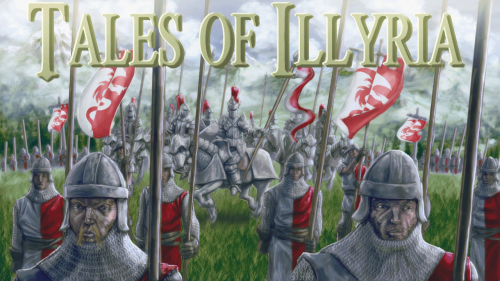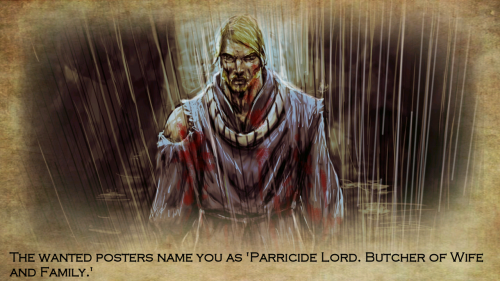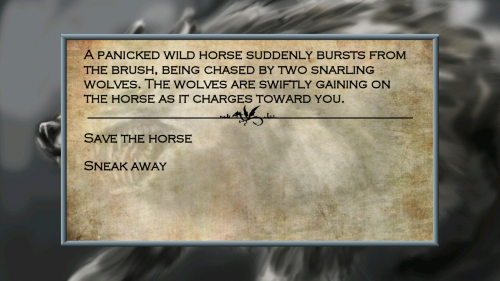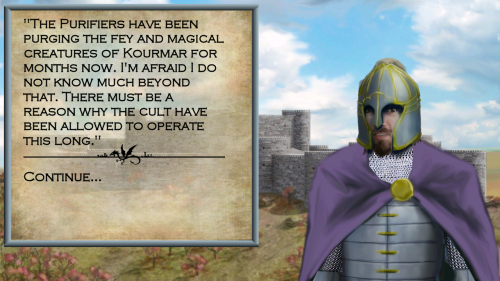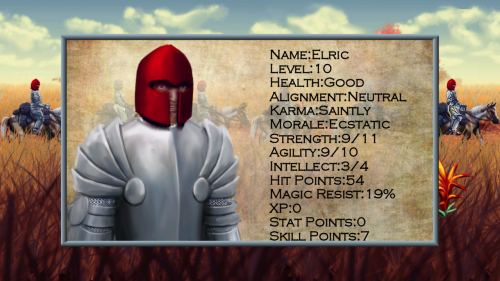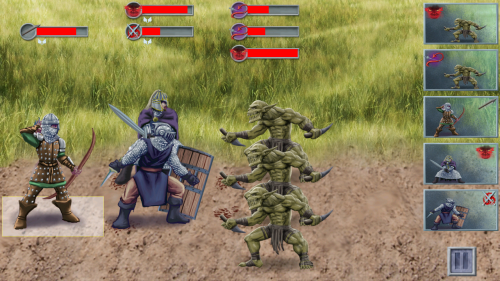RPG Codex Review: Tales of Illyria: Fallen Knight, soon coming to PC
RPG Codex Review: Tales of Illyria: Fallen Knight, soon coming to PC
Review - posted by Crooked Bee on Mon 6 April 2015, 18:42:32
Tags: Little Killerz; Tales of Illyria: Fallen KnightAh, the wonderful world of mobile RPGs... Wait, mobile RPGs? Is there anything there that could legitimately be called one? Apparently Tales of Illyria: Fallen Knight can, and so esteemed community member MicoSelva has undertaken to review it for us. Thankfully, it's coming to PC in 2015, too, so we can all enjoy it soon enough. In the meantime, let's hear whether and why Tales of Illyria is worth waiting for.
Here are a few tidbits from the review to get you in the mood:
Read the full review: RPG Codex Review: Tales of Illyria: Fallen Knight
Here are a few tidbits from the review to get you in the mood:
The RPG Codex first became aware of Little Killerz' Tales of Illyria back in August 2012, when its Kickstarter campaign was launched. The game's reception on the forum was somewhat lukewarm, due to issues such as its limited combat animations, the perceived dissonance between its promise of a pen & paper feel and its Final Fantasy-inspired mechanics, and Illyria being an actual place in the Balkans. The general reception was not much better, and with only $1765 raised from 97 backers out of a total $23000, the crowdfunding campaign was cancelled in September. However, the developers at Little Killerz continued to work on the game, and it was eventually released for Android on June 19th 2013, after spending some time as an Early Access release on the Google Play Store. The game's name was changed to Tales of Illyria: Fallen Knight, in order to differentiate it from its sequels, the first of which, Tales of Illyria: Beyond the Iron Wall, was released on March 24th 2014, with another one on the way.
Tales of Illyria was originally planned to be released on PC as well, and after multiple delays, the full trilogy is supposed to arrive on Steam in 2015, having already been Greenlit last year.
[...] The gameplay in Tales of Illyria: Fallen Knight is basically a mix of Oregon Trail-style travel sequences, a CYOA event-based narrative, and Final Fantasy-style combat. If that sounds like something unique to you then, well, it is. While none of the mechanics present here are new, they do combine into something I have not encountered before.
[...] The roads of Illyria are far from safe, and travellers can expect to encounter all sorts of events on their way to the next village/town/city/castle. These range from the very simple, such as getting attacked by a pack of wolves or finding a stranded horse, to more exotic events such as stumbling upon a cultist orgy or an entrance to a tomb, which you can then explore. Similarly, in settlements you might, for example, be vomited on by a drunkard or asked by the local guards to help with an investigation. The game is packed with these events (the developers claim there are over 700 unique sequences) and they are the definite highlight of the game in terms of writing and appeal. Although you will encounter some of the basic ones repeatedly (I must have slaughtered an identical party of slavers at least half a dozen times), many are truly unique, and sometimes they even form small sub-plots with the outcome of later encounters in the sub-plot being determined by your decisions in previous ones.
Usually events are resolved in a few minutes at most, but the largest ones, like dungeons or multi-stage combat quests can take much longer (I would estimate up to half an hour). Typically you cannot save during these events, which can be a pain in the ass, but they make for some of the most challenging content in the game and are rather satisfying to complete, even if they do not always grant the biggest rewards.
[...] Tales of Illyria: Fallen Knight is a very interesting title. I could call it 'the best mobile RPG I have ever played', but that would be both overly enthusiastic and overly narrow praise (I've only played a few others, and they were mostly crap). While it has its flaws - obfuscation of mechanics and the poor UI being the most obvious ones - it is a decent game with more mechanical depth than many modern PC/console RPGs, at least on the non-combat side of things. Illyria's standout features are its random events and CYOA gameplay, so a lot depends on whether that's your kind of thing. Some will embrace the variety this design offers, excited to see what the game will throw at them next. Others will hate its inherent passiveness and become bored of watching the travel animation and tapping herbs while waiting for the next event to occur. I belong to the former group, obviously. The world of Illyria never ceased to entertain me and I was always looking forward to whatever lay ahead. The game should probably be avoided by those who play RPGs mostly for combat. This aspect of the game is rather simple, and its mechanics are too obfuscated to appeal to min-maxers.
Tales of Illyria was originally planned to be released on PC as well, and after multiple delays, the full trilogy is supposed to arrive on Steam in 2015, having already been Greenlit last year.
[...] The gameplay in Tales of Illyria: Fallen Knight is basically a mix of Oregon Trail-style travel sequences, a CYOA event-based narrative, and Final Fantasy-style combat. If that sounds like something unique to you then, well, it is. While none of the mechanics present here are new, they do combine into something I have not encountered before.
[...] The roads of Illyria are far from safe, and travellers can expect to encounter all sorts of events on their way to the next village/town/city/castle. These range from the very simple, such as getting attacked by a pack of wolves or finding a stranded horse, to more exotic events such as stumbling upon a cultist orgy or an entrance to a tomb, which you can then explore. Similarly, in settlements you might, for example, be vomited on by a drunkard or asked by the local guards to help with an investigation. The game is packed with these events (the developers claim there are over 700 unique sequences) and they are the definite highlight of the game in terms of writing and appeal. Although you will encounter some of the basic ones repeatedly (I must have slaughtered an identical party of slavers at least half a dozen times), many are truly unique, and sometimes they even form small sub-plots with the outcome of later encounters in the sub-plot being determined by your decisions in previous ones.
Usually events are resolved in a few minutes at most, but the largest ones, like dungeons or multi-stage combat quests can take much longer (I would estimate up to half an hour). Typically you cannot save during these events, which can be a pain in the ass, but they make for some of the most challenging content in the game and are rather satisfying to complete, even if they do not always grant the biggest rewards.
[...] Tales of Illyria: Fallen Knight is a very interesting title. I could call it 'the best mobile RPG I have ever played', but that would be both overly enthusiastic and overly narrow praise (I've only played a few others, and they were mostly crap). While it has its flaws - obfuscation of mechanics and the poor UI being the most obvious ones - it is a decent game with more mechanical depth than many modern PC/console RPGs, at least on the non-combat side of things. Illyria's standout features are its random events and CYOA gameplay, so a lot depends on whether that's your kind of thing. Some will embrace the variety this design offers, excited to see what the game will throw at them next. Others will hate its inherent passiveness and become bored of watching the travel animation and tapping herbs while waiting for the next event to occur. I belong to the former group, obviously. The world of Illyria never ceased to entertain me and I was always looking forward to whatever lay ahead. The game should probably be avoided by those who play RPGs mostly for combat. This aspect of the game is rather simple, and its mechanics are too obfuscated to appeal to min-maxers.
Read the full review: RPG Codex Review: Tales of Illyria: Fallen Knight
[Review by MicoSelva]
Introduction
The RPG Codex first became aware of Little Killerz' Tales of Illyria back in August 2012, when its Kickstarter campaign was launched. The game's reception on the forum was somewhat lukewarm, due to issues such as its limited combat animations, the perceived dissonance between its promise of a pen & paper feel and its Final Fantasy-inspired mechanics, and Illyria being an actual place in the Balkans. The general reception was not much better, and with only $1765 raised from 97 backers out of a total $23000, the crowdfunding campaign was cancelled in September. However, the developers at Little Killerz continued to work on the game, and it was eventually released for Android on June 19th 2013, after spending some time as an Early Access release on the Google Play Store. The game's name was changed to Tales of Illyria: Fallen Knight, in order to differentiate it from its sequels, the first of which, Tales of Illyria: Beyond the Iron Wall, was released on March 24th 2014, with another one on the way.
Tales of Illyria was originally planned to be released on PC as well, and after multiple delays, the full trilogy is supposed to arrive on Steam in 2015, having already been Greenlit last year.
This review is based on one full and one partial playthrough of the game.
Story and Quests
Note: This section contains limited spoilers, that do not reach further than around one hour into the game.
The good news when it comes to the story of Tales of Illyria: Fallen Knight is that it's not about saving the world. Instead, things start off personally, when your character, Lord Elric Farenthal of Tortha, is falsely accused of murdering his own family and is forced to become a fugitive. However, you almost immediately become involved in a political power struggle, after being contacted by a representative of Lord Benton, your country's dethroned King, who since the Hysperian Empire conquered Tortha is only a vassal of its ruler, Emperor Gareth. Benton enlists your services to assist in his plans for regaining the throne, promising you revenge in the process.
This is a very good set-up for a number of reasons. First, you get to follow your own personal quest while at the same being involved in larger events, which is kind of like having the proverbial cake and eating it. Second, there is no false sense of urgency. Yes, some things need to be done while the preparations for war are made, but those things can take time and there is no immediate danger to be concerned about, so it doesn't feel weird when you divert your attention to other matters. It took me around a year of in-game time to finish the story, which was plausible enough to suspend my disbelief, even if still rather short compared to authentic medieval conflicts.
As for the quality of the story itself, it's... okay. While it is consistent, reasonably paced and offers a few twists, it will not bring you to your knees, and it's really more of an excuse to drag you all over Illyria to experience the multitude of events that will occur during your travels. You start out alone, but are soon joined by two companions (assuming you follow the storyline) and eventually gain a full party of six.
The game comes with a PDF-based manual called Illyria Codex, written in-character by a scholar named Gaius Gnaius Iustus, which details the world's back story. If you are interested in the lore, you will have to read the manual, because the information contained within the game itself is very limited. If you skip it, then even after spending many hours on the roads of Illyria, you may still find yourself becoming confused as to who exactly is who, what the relationships between various peoples are, and crucially, whether the patrol of guards heading your way is friendly or whether you should try to avoid it. The manual also describes most of the game's mechanics and provides some tips, so if you are new to RPGs, you might want to read it to learn why your party might want to specialize in persuasion or stealth.
Gameplay
The gameplay in Tales of Illyria: Fallen Knight is basically a mix of Oregon Trail-style travel sequences, a CYOA event-based narrative, and Final Fantasy-style combat. If that sounds like something unique to you then, well, it is. While none of the mechanics present here are new, they do combine into something I have not encountered before.
Most of your time in the game is spent alternating between town and travel screens. In settlements, you can stock up on supplies (food, water, wine and furs), buy and sell equipment, train your skills, and maybe also rest at a tavern, pray at a chapel, or pay for a night of relaxation for one of your party members at the local brothel. Not every facility is available everywhere, so don't expect a lousy three hut village in the middle of the Hysperian nowhere to have a mage's guild (or a brothel). However, you can always expect to be able to at least resupply and rest - if you have enough money, that is.

Settlement descriptions are your main source of knowledge about the game world, outside the manual.
Food and water are consumed regularly as you travel, although at different rates depending on the time of year (people drink a lot more water in the summer). Furs are randomly used up during the winter, so while you need only one per party member, make sure to bring spares. Wine is the least essential resource, as it is needed only for boosting morale while resting on the trail, which I rarely did (plus there are other ways to boost morale). Still, it's worth it to always have some on hand, because you never know what might happen during your travels.
And a lot CAN happen. The roads of Illyria are far from safe, and travellers can expect to encounter all sorts of events on their way to the next village/town/city/castle. These range from the very simple, such as getting attacked by a pack of wolves or finding a stranded horse, to more exotic events such as stumbling upon a cultist orgy or an entrance to a tomb, which you can then explore. Similarly, in settlements you might, for example, be vomited on by a drunkard or asked by the local guards to help with an investigation. The game is packed with these events (the developers claim there are over 700 unique sequences) and they are the definite highlight of the game in terms of writing and appeal. Although you will encounter some of the basic ones repeatedly (I must have slaughtered an identical party of slavers at least half a dozen times), many are truly unique, and sometimes they even form small sub-plots with the outcome of later encounters in the sub-plot being determined by your decisions in previous ones.
Usually events are resolved in a few minutes at most, but the largest ones, like dungeons or multi-stage combat quests can take much longer (I would estimate up to half an hour). Typically you cannot save during these events, which can be a pain in the ass, but they make for some of the most challenging content in the game and are rather satisfying to complete, even if they do not always grant the biggest rewards.
Many of the events will engage at least one of your party members, and often more than one. They will comment, give advice, squabble among themselves and with other NPCs, approve or criticize your decisions, and in general, express their personalities in various ways. As far as I can tell, all the companions are mandatory and connected to the main storyline. This might be seen as limiting the game's replayability, but it does make for a somewhat stronger narrative. Why 'somewhat'? Because while all the companions are interesting and their writing is solid, the game doesn't really give you the tools to become very attached to them. What I mean is that you have no way of interacting with companions - you just respond when they interact with you. Maybe better writing would have been able to compensate for this, but as it is, I did not feel very emotionally engaged™ when the story decided to put my companions in grave peril, and they just felt less real to me than, for example, Ian, Morte or Edwin.
This lack of player agency also extends to the game's side quests. For some of them, you just need to pay attention and figure out where to go (checking the journal usually helps), but sometimes you can only hope the quest will trigger by itself at some point during your travels.
While you're waiting for the next interesting thing to happen on the trail, you are (thankfully) not forced to just stare at your party's walking animation. Instead, you can occupy yourself with a hunting-gathering minigame. While you travel, game and herbs appear in the background and foreground of the travel screen which you can click/tap on, triggering a skill check for hunting and alchemy, respectively. Success will net you a small XP reward, and sometimes resources or a morale boost. No worries though, the minigame is not mandatory in any way and can be safely ignored.
Character and Item Systems
Since I mentioned skills, this might be a good time to cover Tales of Illyria's character system. In addition to the obligatory hit points, every character has three base stats, seven non-combat skills, a number of combat skills, six equipment slots and some additional characteristics. Not bad for a mobile game!
Let's get the obvious out of the way: as you gain experience, your characters level up, which grants them a max HP boost, two stat points to distribute, and a number of combat skill points as well (characters with higher intelligence get more).
The stats do mostly what you would expect: Strength boosts melee damage, hit points and carrying capacity, Agility increases accuracy, defence and speed, and Intelligence affects spell power, magic resistance and number of combat skill points. However, their precise impact on combat is hard to determine, because the system is somewhat obfuscated. If you want to know how much of a damage bonus you get after increasing Strength from 8 to 10, tough luck.
The game's level cap is 10, so over the course of your adventure you will receive around twenty stat points for Lord Elric, and fewer for companions who join you already levelled up. The higher the level at which they join, the more they are developed in a certain role, so while the system is technically classless, you don't really have as much flexibility in customizing your party as you might think. In my opinion, it is best to develop Elric into a pure melee fighter or some kind of hybrid warrior. You can choose to be a pure mage or an archer if really you want, but that means either casting/shooting from the front row (which makes it less effective) or hiding behind one of your more squishy party members. You can try to develop them into hybrids too, but that means going against their 'natural' strengths which just doesn't feel right, or at least it didn't for me.
Looking at the combat skills, it's clear that warrior, archer and mage are the three character archetypes supported by the system. The melee and ranged skill sets are similar and can be broken down to standard combat, combat focusing on fast attacks, combat focusing on precision strikes, etc. The magic system is a somewhat different animal, with a variety of spells that inflict either direct damage (often to multiple targets) or a status effect. Learning and improving these skills requires both skill points and gold, and while the skill points cost is static (1 SP per level), the gold cost increases exponentially (from 40 gold for learning a new level 1 skill to a whopping 640 to improve it from level 4 to 5). And since that is only one of many money sinks in this game, your tales of Illyria will most probably be tales of seeking ever more gold to fill the pockets of skill trainers all over the world so you can improve your party's combat skills to keep up with the level scaling. You will also quickly learn to laugh off any dream of maxing out multiple skills, unless you are the type of player who is able to spend half a year grinding werewolves without going mad in the process (where do they keep all that gold anyway?). Mastery in multiple skills is really only viable for mages, unless you invest in your fighters' intelligence, which makes them worse at, well, fighting.
But wait a minute, I just used a dirty phrase: level scaling. That requires elaboration. Main quest encounters are not level scaled, but most (if not all) random ones are subject to it. It's not as bad as you might think, though. Level 9 goblins will be tougher than level 2 goblins, but you still defeat them rather easily - much easier than level 9 trolls. Your location in the world determines encounter difficulty more than your level does, so going back to an earlier area to grind easier enemies is a viable strategy (although it is probably more useful for grinding for gold rather than experience). Also, I believe advancing to level X does not mean that all enemies in the world advance to level X as well - it's more like their level range changes to 'up to X'. That said, if you level up a few times but 'forget' to improve your stats and skills along the way, you will start getting your ass kicked.
Moving on to non-combat skills. There are seven of them: Alchemy (knowledge of herbs and concoctions), Discernment (a harder to pronounce version of perception), Engineering (knowledge of all sorts of mechanical stuff), Hunting (your non-combat bow skills), Persuasion (used when you really want someone to believe what you say), Scouting (like discernment, but... long range) and Stealth (used when hiding or sneaking about). All of these are used throughout the game, and while the number of checks for each one is definitely not equal, I never felt like I could just ignore a skill altogether. I would say that Alchemy and Hunting are the most important, because they see so much use during travel that they basically pay for themselves. Discernment and Engineering would be close seconds, being the skills most often required during events. Persuasion, Scouting and Stealth checks are less common, but failing them usually has more serious consequences.
When I said that Alchemy and Hunting pay for themselves, I meant that quite literally. As with the combat skills, to improve your non-combat skills you have to pay trainers. Some of these are harder to find than others - while any blacksmith can teach you Engineering, finding someone who will improve your Scouting skill can be a challenge. Non-combat skills are completely independent from experience points and levelling up. Improving them costs 5 gold per skill level per character, and you have to train your entire party at once. This means that early in the game, while Elric is still alone, he can increase his Hunting skill relatively cheaply, but later, when you have the entire party of six, it will cost you a considerable amount of gold. My problem with this system is that I have no idea how it actually works. Let me give you an example. My party's Alchemy skill was already at 8 (out of 10) when I got the last party member, whose Alchemy skill was pretty low (1 or 2, I believe). Did his low skill level reduce my chances of passing Alchemy checks (because it lowered the average), improve it (because the total matters), or not affect it at all (because only the highest value is checked)? The first option makes no sense (as in common sense), the second one makes no sense either (from a game design perspective) and the third one, which seems the most likely, makes the requirement of paying to improve your entire party's skill level at once pure trolling from the designer. But whichever it is, this is another aspect of the character system that would have benefited from more transparency.
Itemization is another. There are five types of equipment in the game: weapons, armour, shields, helmets and amulets. Weapons consist of bows (the only option for ranged combat), two-handed melee and one-handed melee, the latter of which allows you to use a shield. Amulets typically provide immunity to certain status effects, 50% damage resistance to certain spells, or grant a minor stat boost. The problem is that the stats on most items aren't explained at all. For example, what exactly does your armour value do? My guess is that it's a percentage-based damage reduction, but it could be anything. Weapons have a damage value, but also two secondary stats - finesse and parry. The tooltips for these explain that they improve your chances of hitting the enemy and avoiding hits, respectively. That's great, but by how much? Is it better to use a weapon with higher finesse, or one with greater damage? How much accuracy am I sacrificing by switching from an 8dam/6fin spear to a 14dam/4fin hammer? Will it increase or decrease my damage output? How does a spear with 7 parry compare to a shield with 6 block? Do they even do the same thing? What does it mean that my armour has 50% chain and 60% plate coverage? Does it even affect anything? Eventually, all of my casters ended up clad in chain mail (since they were too weak to wear plate) as I assumed it does not affect their spellcasting ability. However, all the enemy casters I met in the game wore either cloth or leather, so maybe my assumption was wrong? And does that lightning spell really deal more damage to characters in metal armour, or is that just wishful thinking colouring my perception?
The game's equipment progression has a nice, steady curve. Although the scale of stat values is relatively low numerically speaking, it still manages to provide a fair amount of diversity in terms of type and quality of equipment. This is, however, somewhat diminished by the aforementioned lack of transparency, since it's hard to tell just how much better that new sword is compared to the previous one (though you will soon learn that if it's more expensive, it's probably better). It's worth noting that the equipment system is the only part of the game where it seems like it's not trying to screw you over financially - you can always sell your items for the same price it cost to buy them (which is unusual in games overall). This makes upgrading equipment smoother, though it's still not cheap - even small stat improvements, like upgrading from a 5 damage/3 finesse/2 parry dagger to a 6/4/3 one, can cost double the original item's price. Magical equipment is scarce, and even if you are lucky enough to find an enchanted item in a store, it's unlikely that you'll be able to afford it unless you intentionally saved up. And it's quite likely that you'll deem the magical enhancement not worth the cost anyway, because you'll have no idea how much of an advantage that '+1 strength' actually provides.
Besides all that, the game also has an equipment slot for horses. Horses are not used in combat, but instead increase your carrying capacity and allow you to travel faster (although you will need a good saddle for that too). There's really not a lot more to it. As far as I can tell, horses do not require any upkeep. They do not eat or drink water, so you do not have to take them into account when buying supplies. They're just another money sink if you want to travel really fast - personally, I just stuck with my sturdy mustangs.
Tip: Do not buy the cheapest type of saddle, as you will get them automatically when 'equipping a horse', which will save you 25 gold per character.
Another tip: You can buy more than six horses if you need more carrying capacity (although you probably will not).
Before I conclude my discussion of the character system, there are a few additional values to take into account: Alignment, Morale, Karma and Status. Alignment determines a character's world view, and whether good or evil deeds you perform will increase or decrease their Morale. Morale affects a character's stats (low Morale inflicts a penalty, while high Morale grants a boost) and party events (you do not want to travel with a low Morale party - trust me on this). Karma is your typical morality meter, although with a small twist in that it is supposedly an actual thing that exists in the game world, which affects supernatural creatures who will know whether you've been good or evil and act accordingly. Finally, Status describes whether a character is healthy or suffering from some kind of affliction - maybe he/she drank contaminated water and now has dysentery, or maybe getting knocked out in combat broke some ribs. Different afflictions affect different stats, and they have various levels of severity, such as 'mild' or 'serious'. Some heal themselves over time, while others will require treatment from a priest in a chapel.
Combat
Combat in Tales of Illyria is in the vein of classic Final Fantasy, but with a mild twist in its implementation of front and back rows. As long as there is at least one combatant in the front row, no enemy can approach characters in the back row, meaning they cannot be targeted by melee attacks. This makes for a simple system in which target prioritization and assigning correct behaviours to characters are key to winning in the more difficult battles. Sometimes you might want all your characters to focus on the enemy shield wall to get to those nasty casters and/or archers as soon as possible. Sometimes your front line will try to hold off the enemy to buy time for your ranged attacks to give you the advantage. And sometimes you'll just watch the fight without reacting at all, in those battles where your party's AI can easily defeat the foes by itself.
The game's combat has been described as 'real-time turn-based' by the developer, and while that may seem to make no sense, I would say that it is pretty accurate. Characters attack one at a time (i.e. they take turns), but the game does not wait for your input but instead automatically assigns commands based on the character's chosen AI behaviour. The AI can be overridden for one turn (by assigning a command manually) or just turned off entirely, which will make your characters default to defence and repeatedly execute the last command given to them. You can also pause the combat (which makes it RTwP too, I guess?) and assign new commands without any time pressure, if you feel things are going too fast.
Overall, this system works fairly well. There isn't that much to decide during battles, but you can clearly see your decisions impacting the battlefield and changing the course of battles - if the RNG permits, that is. The random factor in this game is pretty heavy, and you will sometimes utterly lose a fight only to win on the second try despite not doing anything differently. It is here that the lack of transparency comes back to haunt us once again. It's hard to make tactical decisions without knowing what exactly their impact will be. Usually you have to just go with your gut or try different approaches until you find one that works - or just win by pure chance. That said, in terms of difficulty, I played the game in the intermediate 'Standard' difficulty and felt it was just right. 'Casual' and 'Veteran' difficulties are also available, the latter of which, in addition to more difficult combat, allows saving only in cities, which doesn't really make sense in a mobile game, but will be more appropriate in the upcoming PC version. The game's most challenging combat occurs in multi-stage events (which includes dungeons) that have many encounters. You are not allowed to rest between encounters during these events, and healing yourself with magic during combat only restores HP temporarily (until the end of the current encounter).
Choices and Consequences
Tales of Illyria's main plot is basically linear - Lord Benton's offer is, to quote a classic, 'an offer you can't refuse', and that applies to many other 'decisions' you will make throughout the story. Choices you make on the critical path will rarely affect the narrative in any significant way and are usually either fake (whether or not you try to execute an assassin, he will escape anyway), cosmetic (you will read a different paragraph of narration, but no future events will be affected), or small and systemic (refuse to save a would-be companion from slavers and your karma goes down, but you will have to save her anyway).
The situation is somewhat better in the game's side events. Many of them offer choices that can significantly affect their outcomes, which may even lead to follow-up events that differ based on what you chose previously, with occasionally amusing results. In short, the further away from the main quest an event is, the more impact your decisions will tend to make on it.
Presentation and Technical Matters
Tales of Illyria is mainly presented as a series of static images, which are of decent quality. The only animation in the game is when you're on the road (walking) and in combat. To say that the animations are basic would be an understatement - they barely qualify as animations at all and you can easily see every individual frame in all its glory. Supposedly, the animations will be improved for the PC version, so that may cease to be an issue in the future (assuming you consider it an issue at all). On the other hand, the character sprites are nicely drawn, except maybe the female characters' faces, and I appreciate the fact that equipment changes are reflected on them, even if it sometimes makes them look ridiculous.
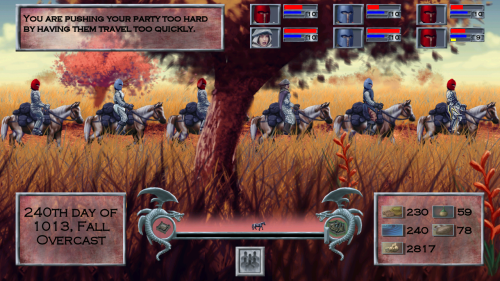
My close-to-endgame party. One of the perks of writing this review is that I get a chance to show it off.
The game's art style is nothing to write home about. A few creature designs stand out, but it's mostly standard medieval fantasy, although more realistic than most - armour with cleavage is rare in Illyria (though if you find some, you can make male characters wear it too!) and you will not see anyone wielding any Buster Swords.
I had the sound disabled for my most of my playthrough, but what I heard of the music, I liked. It fits the mood of the game and has surprising variety. However, I'm pretty sure I didn't hear even half of the 'over 75' compositions claimed to be in the game, so it is possible that all the ones I missed are horrible - although that would surprise me.
The sound effects, on the other hand, are pretty basic, and I did not miss them much after I muted the game. Every time your party makes a skill check, you hear a chime (either for success, or for failure). Usually you make 10-20 skill checks during a travel sequence (because of the hunting/gathering mini-game), so as you can imagine, those get old pretty fast.
As you can probably guess, the game features no voice acting. If that bothers you, you can always imagine Patrick Stewart reading the narration.
Any discussion of Illyria's technical aspects would not be complete without mentioning its UI. Many Codexers have very strong feelings about well-presented, efficient and easy-to-use user interfaces, and I can definitely say that this game is not for them. I don't want to indulge in any flowery metaphors or talk about wanting to cut myself with broken glass, so I will just say that the UI is... not good. It just isn't. At best, it is ugly but workable, like the town screen textual menu. At worst, it is a time-wasting atrocity. For example, how many clicks/taps do you think it takes to change a character's weapon? Let's count - 1: Party menu, 2: Party, 3: Character, 4: Equip, 5: Weapon, 6: Change, 7: Melee/Ranged?, 8: Pick new weapon, 9: Equip, 10: Back, 11: Back, 12: Back, 13: Back, 14: Back - yeah, I think I just changed my mind about the broken glass.
The character sheet is ugly and hard to read, with the stats listed one after the other with no spacing, logical grouping or any emphasis on the more important ones, and with unnecessary scrolling, character portraits that take up too much space, and a ton of screen real estate wasted due to the wide borders on every side of it.
In short, the UI could use some work, in terms of both usability and aesthetics. Supposedly it is being improved for the PC version (and the addition of keyboard shortcuts might help too), so there is some hope.
Hint: The more saved games you have, the longer it will take to load one. Use a file manager to delete/move save files when load times become too long.
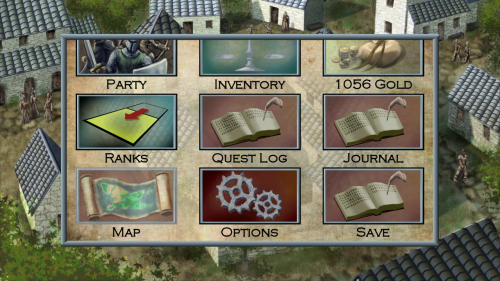
'Quest Log' is for quests and 'Journal' is for... different quests. Also, clicking/tapping on 'Gold' does nothing.
Summary
Tales of Illyria: Fallen Knight is a very interesting title. I could call it 'the best mobile RPG I have ever played', but that would be both overly enthusiastic and overly narrow praise (I've only played a few others, and they were mostly crap). While it has its flaws - obfuscation of mechanics and the poor UI being the most obvious ones - it is a decent game with more mechanical depth than many modern PC/console RPGs, at least on the non-combat side of things. Illyria's standout features are its random events and CYOA gameplay, so a lot depends on whether that's your kind of thing. Some will embrace the variety this design offers, excited to see what the game will throw at them next. Others will hate its inherent passiveness and become bored of watching the travel animation and tapping herbs while waiting for the next event to occur. I belong to the former group, obviously. The world of Illyria never ceased to entertain me and I was always looking forward to whatever lay ahead. The game should probably be avoided by those who play RPGs mostly for combat. This aspect of the game is rather simple, and its mechanics are too obfuscated to appeal to min-maxers.
Regarding longevity and replayability - I started my first playthrough in mid-September and it took me over four months of mostly toilet gaming to get through the game. In terms of hours, my rough estimation would be around thirty. I started my second playthrough to do some additional research for this review, and I was surprised by how much fun it was to experience the early parts again, encounter events I had never seen before, and try out some alternate choices (even if some of them turned out to be non-choices). I actually had to remind myself that I don't have time to replay games these days, and that many others (the game's sequel included) are waiting, so I'd say the game probably does something right in this area.
As a final word, if you are interested in Tales of Illyria but are still not sold on it and/or would prefer to see the game in motion before making a decision, I recommend watching Matt Barton's video review, which is how I learned about this title in the first place.
Sources
Amazon:
http://www.amazon.com/Little-Killerz-TOI-Fallen-Knight/dp/B00DGYZRG4
Google Play:
https://play.google.com/store/apps/details?id=com.littlekillerz.ringstrail
Steam Greenlight:
http://steamcommunity.com/sharedfiles/filedetails/?id=92964311
Kickstarter:
https://www.kickstarter.com/projects/550486427/tales-of-illyria-a-unique-rpg/
Codex Kickstarter thread:
http://www.rpgcodex.net/forums/index.php?threads/75612/
Codex thread:
http://www.rpgcodex.net/forums/index.php?threads/84080/
YouTube:
https://www.youtube.com/watch?v=8sPEkJPodB0
There are 23 comments on RPG Codex Review: Tales of Illyria: Fallen Knight, soon coming to PC





